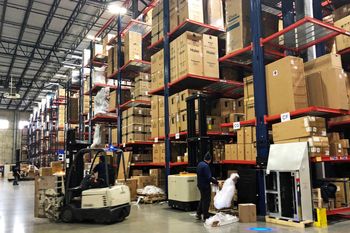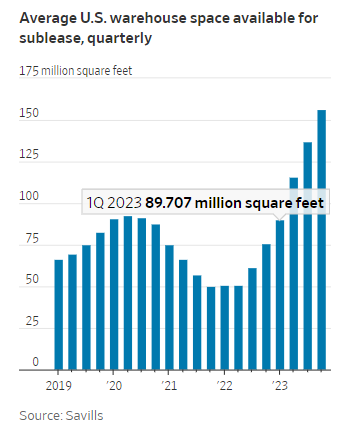Subleases are surging as companies pare back storage capacity they built up during the pandemic.

Retailers and their suppliers have been slashing their inventories. Now they’re turning to cutting back storage space.
A once-booming U.S. warehousing market is coping with signs of contraction as businesses consolidate warehouses and in some cases upgrade existing sites rather than add facilities. The shift comes as retailers have turned the corner on a big drawdown of inventories and are aligning their supply chains for more normal, prepandemic stocking and consumer spending patterns.
Consumer-goods maker
, retail-pharmacy chain
and sports-apparel retailer Fanatics are among the merchants closing warehouses or upgrading existing facilities rather than opening new sites this year.
Other companies are unloading storage capacity by subleasing space. The amount of U.S. warehouse space listed for sublease reached a record high of more than 156 million square feet in the fourth quarter of 2023, more than three times the amount available in the fourth quarter of 2021, according to real-estate services firm

That marks a significant change for an industrial real-estate market that saw demand explode and vacancy rates plummet during the pandemic, as e-commerce orders soared and retailers stocked up on goods to avoid supply-chain disruptions.
The tight market pushed the average warehouse asking rent up by nearly 24% in 2022 year-over-year, compared with an annual increase of 6.3% in 2019 before the pandemic, according to real-estate services firm JLL. The growth in rents has slowed more recently, with rents rising 12.5% in 2023 compared with the period a year earlier, according to JLL.
The turnabout comes as more manufacturers and retailers are returning to the “just-in-time” lean inventory management strategy that had given way to greater stockpiling during the pandemic, as companies sought to build so-called buffer stock amid product shortages and widespread supply chain disruptions.
Some businesses now are subleasing space they had added “based on projections that didn’t come to fruition,” said Mark Russo, head of industrial research at Savills. “It was a lot of just-in-case inventory management thinking and thinking that that level of consumption was going to keep going up.”
Russo said companies are retooling their supply chains to match projections for more moderate growth in consumer spending.
“We’re coming off of a really unusual, heightened period of demand, and that’s normalizing,” he said.
Russo noted space listed for sublease represents a small portion of total available warehouse space as developers complete construction on buildings across the country that were started without tenants lined up, known as speculative development.
Many companies now are consolidating warehouses and upgrading to newer buildings that can accommodate more automation and require less labor, said Mehtab Randhawa, global head of industrial research at JLL.
“If you’ve got three different facilities or four different facilities and your real-estate costs are high, if you’re coming up on renewal, it might make sense to go down from four to three in a more efficient facility,” Randhawa said.
Newell Brands, which makes Yankee Candles and Sharpie markers, said it is closing a home-fragrance distribution center in Pataskala, Ohio, in March. A company spokesperson said the building’s operations will move to an existing warehouse in Newville, Pa., as part of a broader plan to reduce its number of distribution centers and instead run “more regionalized, multisourced plants with upgraded automation and digitization capabilities.”
Rite Aid, which filed for bankruptcy in October, is closing hundreds of stores and plans to close a warehouse in Woodland, Calif., and shift operations to another facility in Lancaster, Calif., beginning in May, a spokesperson said.
Fanatics is shutting down a warehouse in Jacksonville, Fla. A company spokesman said the building is one of the oldest logistics facilities the company operates. “We will be shifting our fulfillment efforts to newer buildings in and around the region where we have access to updated technology and infrastructure to ensure a better fan experience,” the spokesman said.
New warehouse space remains in the industrial-property pipeline. Warehouse leasing activity across the U.S. increased 14.8% in the fourth quarter compared with the third quarter, although that was down 9% compared with the same quarter the year before, according to JLL.
Reference & credits to
By Liz Young Follow.

